
Amatu'l-Bahá Rúhíyyih Khánum, born Mary Sutherland Maxwell, was the wife of Shoghi Effendi from 1937 to 1957 and a prominent figure in the development of the Baháʼí Faith. In 1952, she was elevated to the Baháʼí rank of Hands of the Cause, for which she attended to issues related to the expansion and protection of the religion, and served an important role in the transfer of authority from 1957 to 1963.

Bonnie Bartlett Daniels is an American actress. Her career spans seven decades, with her first major role being on a 1950s daytime drama, Love of Life. Bartlett is known for her role as Grace Snider Edwards on the Michael Landon television series Little House on the Prairie and as Ellen Craig on the medical drama series St. Elsewhere. Her husband, actor William Daniels, played her fictional husband Dr. Mark Craig, and they both won Emmy Awards on the same night in 1986—becoming the first married couple to accomplish the feat since Alfred Lunt and Lynn Fontanne in 1965.

Happy Salma is an Indonesian actress, theater producer and jewelry entrepreneur. She is one of the most influential figures in Asia, according to the Tatler Malaysia in 2020.

Giring Ganesha Djumaryo is an Indonesian vocalist and political activist. He is a former lead singer of the Indonesian rock band, Nidji. On 31 December 2017, he announced his resignation as Nidji's lead vocalist in order to focus on his political journey. Giring is the former Leader of Indonesian Solidarity Party (PSI). He was previously Acting Leader to cover for Grace Natalie while she pursued her master's degree.

Djadoeg Djajakusuma was an Indonesian film director and promoter of traditional art forms. Born to a nobleman and his wife in Temanggung, Central Java, Djajakusuma became interested in the arts at a young age, choosing to pursue a career in theatre. During the Japanese occupation from 1943 to 1945 he was a translator and actor, and in the four-year national revolution which followed he worked for the military's educational division, several news agencies, and in drama.

Abisin Abbas, better known by his pseudonym Andjar Asmara, was a dramatist and filmmaker active in the cinema of the Dutch East Indies. Born in Alahan Panjang, West Sumatra, he first worked as a reporter in Batavia. He became a writer for the Padangsche Opera in Padang, where he developed a new, dialogue-centric style, which later spread throughout the region. After returning to Batavia in 1929, he spent over a year as a theatre and film critic. In 1930 he joined the Dardanella touring troupe as a writer. He went to India in an unsuccessful bid to film his stage play Dr Samsi.

Ratna Asmara, also known as Ratna Suska, was an Indonesian actress and director. Originally active in theatre, she starred in the romance film Kartinah (1940), which her first husband Andjar directed.

Jessica Iskandar is an Indonesian actress, model, presenter, singer, businessperson, comedian and writer. She is also known by her nickname, Jedar.
The Citra Award for Best Supporting Actress is an award given at the Indonesian Film Festival (FFI) to Indonesian actresses for their achievements in a supporting role. The Citra Awards, described by Screen International as "Indonesia's equivalent to the Oscars", are the country's most prestigious film awards and are intended to recognize achievements in films as well as to draw public interest to the film industry.
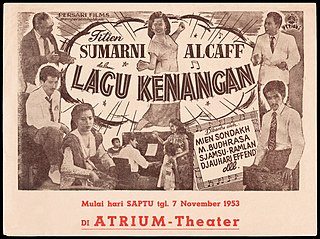
Lagu Kenangan is a 1953 Indonesian film directed by L. Inata and produced by Djamaluddin Malik for the Persari Film Corporation. Starring Titien Sumarni and A. N. Alcaff, it follows the domestic troubles of a composer and his wife.
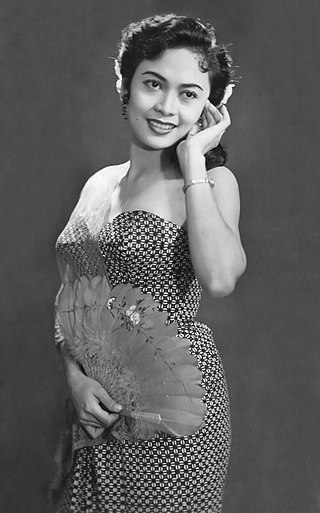
Ermina Zaenah was an Indonesian actress and film producer who was active in the 1950s and 1960s. She was part of Classical Indonesian Cinema.

Raden Ajeng Titien Sumarni was an Indonesian actress and producer who was active in the 1950s. She was called the most beautiful actress of the 1950s. Born in Surabaya, she moved to Tasikmalaya as a child and developed an interest in stage acting, trained by her uncle and future husband Mustari, later acting for republican troops during the Indonesian National Revolution. Sumarni began acting in film in 1951, making her debut with Seruni Laju. Over her five-year career Sumarni acted in thirty films, established her own film production company, and became one of the most popular Indonesian actresses of her time. Following her final film, Sumarni fell out of the spotlight, eventually dying in 1966.
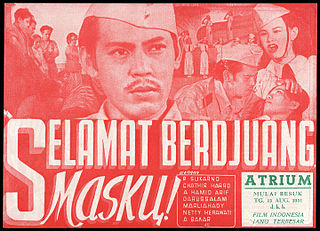
Selamat Berdjuang, Masku! is a 1951 Indonesian film directed by R.H. Andjar Subyanto and starring Raden Sukarno and Marlia Hardi. It follows a former guerrilla leader who must pursue his love despite the interference of his former comrades.

Marlia Hardi was an Indonesian actress who was active from 1950s to 1980s. Born in the Magelang, she took to the stage in the 1940s before moving to Jakarta in 1949. Two years later she made her feature film debut in Untuk Sang Merah Putih. Over the next two decades she appeared in over seventy films, became recognized for her depictions of mothers, and received the Citra Award for Best Supporting Actress. Despite her productiveness, however, she sank into debt and committed suicide at the age of fifty-eight.
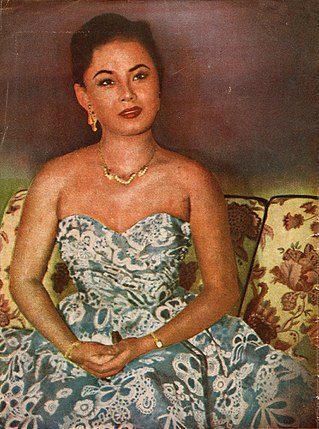
Netty Herawaty was an Indonesian actress who made more than fifty films between 1949 and 1986.

Darussalam was an Indonesian actor who appeared in more than seventy films in his forty-year career. Born in Bengkulu, he studied to be nurse before migrating to theatre during the Japanese occupation of the Dutch East Indies, marrying Netty Herawaty while with the troupe Irama Masa. The couple spent the remainder of the occupation and the ensuing revolution touring the archipelago with a number of troupes. In 1949, Darussalam and Herawaty made their feature film debut in Fred Young's Saputangan, appearing in seven further Young productions before migrating to Djamaluddin Malik's Persari. During their eight years with the company, Darussalam and Herawaty travelled to the Philippines and Singapore and found popularity among audiences, though Darussalam remained in his wife's shadow.
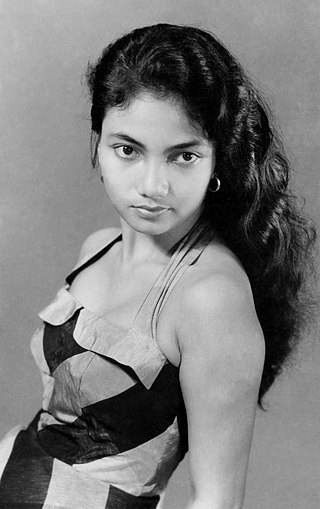
Eliza Firmansjah Noor, better known as Lies Noor, was an Indonesian actress and model. Rising to popularity after her appearance in 1952's Pulang (Homecoming), directed by Basuki Effendy, by 1955 Noor was able to demand fees of Rp 10,000 for her film appearances.
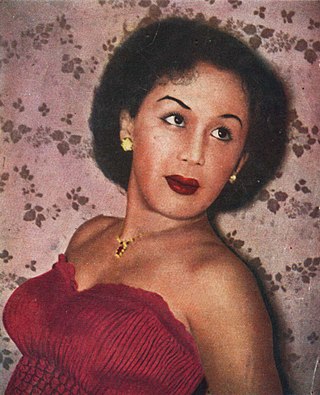
Roostijati was an Indonesian actress, soldier, radio announcer, director, athlete, teacher, and make-up artist. She was the sister of actor Djoni Sundawa and was the second Indonesian women director after Ratna Asmara by directing Genangan Air Mata (1955), and was one of the six Indonesian women director before 1998. She was the part of Classical Indonesian Cinema.
Genangan Air Mata is a 1955 Indonesian drama film directed by The Teng Chun and Roostijati who also starred in this film with Djoni Sundawa.




















